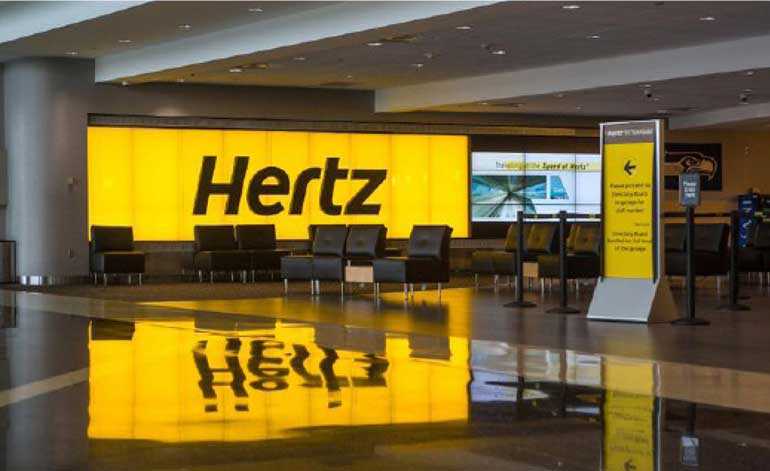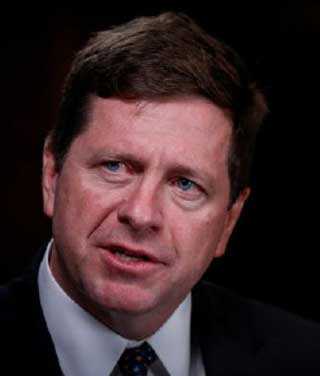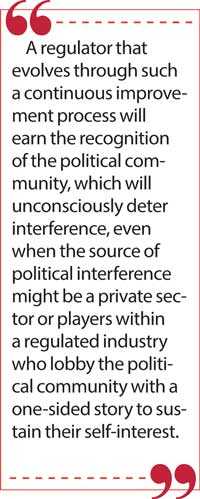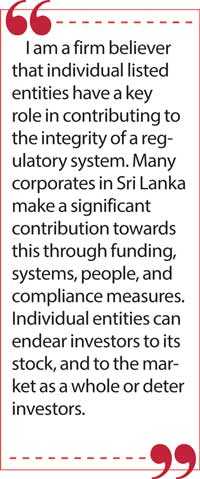Saturday Feb 07, 2026
Saturday Feb 07, 2026
Wednesday, 8 July 2020 00:00 - - {{hitsCtrl.values.hits}}

Before I share thoughts on the Hertz story, let me re-present a necessary background or introduction for the benefit of new readers, practitioners of regulation and corporate governance, local and foreign
 |
|
US SEC Chairman Jay Clayton |
university graduate and PhD students, who seek guidance and clarification on my writings. I thank them for their interest, since it keeps me committed to these articles.
Sustaining regulatory integrity
We regulators speak of the integrity of a regulatory system and defend the institution and its people from any political interference, which might otherwise lead to regulatory forbearance. However, as I have mentioned in this column, such defence is only possible if the regulator, as an institution, is adequately legally enabled-with progressive legal scope and coverage reviews and amendments, and the people within regulatory institutions, are continuously professionally developed, “capacity-built”, and are also up-to-date, aware, competent, confident, and courageous, yet independent, objective, sensitive, fair and just.
SEC, SLAASMB, Consumer Affairs – continuous improvements are necessary
My experience in three domains, through statutory appointments thereto, in capital markets at the SEC; in accounting and auditing standards monitoring at SLAASMB; and in consumer protection as a member of the Consumer Affairs Council under the Consumer Affairs Authority, prompts me to suggest that  improvements and upgrading must be effected on an ongoing, continuous basis.
improvements and upgrading must be effected on an ongoing, continuous basis.
An inherent deterrent
A regulator that evolves through such a continuous improvement process will earn the recognition of the political community, which will unconsciously deter interference, even when the source of political interference might be a private sector or players within a regulated industry who lobby the political community with a one-sided story to sustain their self-interest. This is why the new SEC Bill, with greater scope and coverage, the Demutualisation Bill, and a revised Takeovers and Mergers Code, must soon see the light of day. Simultaneously, the Accounting and Auditing Standards (Monitoring) Act, the Consumer Affairs Authority Act, the Sri Lanka Standards Institution, Company Laws with regard to insolvency and bankruptcy, etc., need urgent review.
The role of individual listed entities
I am a firm believer that individual listed entities have a key role in contributing to the integrity of a regulatory system. Many corporates in Sri Lanka make a significant contribution towards this through funding, systems, people, and compliance measures. Individual entities can endear investors to its stock, and to the market as a whole or deter investors. Rather than refer to Sri Lankan entities, even in general, without names, I will use recent events of just one NYSE-listed US stock as a case study, to articulate my point about how a listed entity can deter investors. I hope that the multiple stakeholders of our Colombo Stock Exchange (CSE) will take a cue.
Hertz files for bankruptcy; not entirely COVID-19 induced
Just over a month ago, in late May 2020, Hertz, the 100-year-old car rental company, filed for bankruptcy, joining J.C. Penney, J. Crew, and Neiman Marcus. Hertz is one of the largest worldwide rental companies, representing one of the most recognised brands in the world and operating in over

10,000 corporate and franchisee locations throughout North America, Europe, The Caribbean, Latin America, Africa, the Middle East, Asia, Australia and New Zealand.
16,000 Hertz employees lost their jobs; about 25% of its workforce. Many companies have sought bankruptcy protection in recent weeks, claiming to be victims of COVID-19. But in all cases, is the failure the coronavirus, or their inability to adapt their business models to changing realities? The Wall Street Journal reported, “Hertz Global Holdings Inc., one of the nation’s largest car-rental companies, filed for bankruptcy, saddled with over $ 19 billion in debt and nearly 700,000 idle vehicles because of the coronavirus.” However, the company has been running losses over the last four years, including in 2019.
Hertz aspires to ethical leadership – just 12 months ago
Just 12 months ago, Hertz is reported to have joined Ethisphere’s Business Ethics Leadership Alliance (BELA) – a globally recognised organisation aimed at promoting ethical leadership and world-class compliance cultures. It was reported that, “As a member of BELA, Hertz will have the ability to measure and benchmark its ethics and compliance program to those of the World’s Most Ethical Companies. Joining BELA further underscores our commitment to strengthen our culture of integrity and compliance, which is the foundation of our business,” said Jeannie Henry, Hertz Vice President and Chief Compliance Officer. A release had further stated, “Every employee at Hertz has a shared responsibility to act with integrity and make ethical decisions. Having the right tools and resources will help us ensure that all employees are making the right decisions no matter what their position is within the company.” Laudable indeed!
Ethics premium
“Research—including Ethisphere’s—shows how organisations with a strong ethical culture regularly outperform their peers. We refer to this as an ethics premium,” said Erica Salmon-Byrne, Executive Vice President, Data and Services and Chair, BELA. “This underscores the value of prioritising a strong, innovative ethics program in an ever-changing business ecosystem. To that end, we are proud to partner with our members to develop new platforms that will help raise the ethical standards at companies in the region and globally.”
CEO Kathryn Marinello walks away with $ 9 million compensation
Former CEO Kathryn Marinello has apparently summed up Hertz’s sad state of affairs, saying, “No business is built for zero revenue.” In a regulatory filing for the fiscal year of 2019, Marinello walked away with $ 9,138,362 in total compensation. According to Salary.com, “Of this total, $ 1,450,000 was received as a salary, $ 1,405,050 was received as a bonus, $ 567,663 was received in stock options, $ 5,635,758 was awarded as stock, and $ 79,891 came from other types of compensation.”
US SEC charges Hertz with inaccurate financial reporting
The following is a reproduction of an Administrative Proceeding posted on the US SEC on 1 February 2019:
“SEC Charges Hertz with Inaccurate Financial Reporting and Other Failures; ADMINISTRATIVE  PROCEEDING, File No. 3-18965
PROCEEDING, File No. 3-18965
“February 1, 2019 - Hertz Global Holdings Inc. and its wholly-owned subsidiary The Hertz Corp. agreed to pay $ 16 million to settle fraud and other charges brought by the Securities and Exchange Commission stemming from multiple company filings containing inaccurate financial statements and disclosures. According to the SEC’s order, from February 2012 through March 2014, Hertz’s public filings materially misstated pre-tax income because of accounting errors made in a number of business units over multiple reporting periods. In July 2015, Hertz restated its financial results for prior periods, identifying $ 235 million in previously reported pre-tax income based on treatment of items that was not consistent with generally accepted accounting principles (GAAP). The SEC’s order finds that the inaccurate reporting occurred in a pressured corporate environment that placed improper emphasis on meeting internal budgets, business plans, and earnings estimates. For example, according to the SEC’s order, improper methodologies were used to determine allowances and write-offs for aged receivables. On several occasions, the methodologies were changed, always with a favourable impact on the financial statements. In one such instance in the fall of 2013, in the midst of severe budget pressure, the methodology was reworked so that some categories of receivables were reserved at an effective rate of 4%, implying a 96% recovery rate that was substantially above historical recovery rates.
“In addition, the SEC’s order finds that in November 2013, approximately five weeks after lowering its 2013 earnings guidance to $ 1.68-$ 1.78 per share, Hertz improperly reaffirmed that guidance, even though a more current internal analysis was projecting earnings per share of only $ 1.65, and another analysis had determined that the previously disclosed range was flawed in part as a result of methodological errors. The SEC’s order also finds that during 2013 Hertz failed to adequately disclose a decision to extend the planned holding periods for substantial portions of its US rental car fleet, which beneficially impacted the company’s financial statements in the short term by lowering the depreciation expense for current quarters, but also carried long-term risks including that older cars were likely to require increased maintenance costs, and could injure Hertz’s premium brand.
“Without admitting or denying the SEC’s findings, the Hertz respondents consented to the SEC order, which was entered on December 31, 2018, finding that Hertz Global violated the antifraud provisions contained in Sections 17(a) (2) and 17(a) (3) of the Securities Act of 1933, and that both Hertz Global and The Hertz Corp. violated various reporting, books and records, and internal accounting controls violations of the Securities Exchange Act of 1934 and relevant rules thereunder. The SEC’s order requires each Hertz respondent to cease and desist from further violations of the charged provisions, and requires Hertz Global to pay a $ 16 million penalty. The SEC’s order acknowledges Hertz’s cooperation in the investigation and its remedial acts.
“The SEC’s continuing investigation is being conducted by Jess Velona, Kenneth Byrne, Christopher Mele, and Adam Grace of the New York Regional Office, and is being supervised by Sanjay Wadhwa.”
Despite bankruptcy, stock price volatility, induced by “judicious” approval
Whilst in the midst of a bankruptcy process, Hertz share price had soared by 20 plus percent, and then had abruptly reversed. The reason attributed to this is that, the bankruptcy judge had approved the company’s issuance of approximately 240 million new shares. This move was to take advantage of the speculative run-up in its stock price! Analysts considered this significant, since it will cause dilution and add pressure to the stock price, and result in its common shares being rendered worthless.
14 years ago in October 2006, a Hertz IPO of 28% to finance dividends to owners
It is interesting that 14 years ago, the Wall Street Journal reported that Hertz had plans to sell a 28% stake in an initial public offering, solely to finance special dividends to its private-equity owners, after which it intended to turn off the “dividend spigot” for new shareholders. It is reported that a private equity firm heaped a whole lot of debt on Hertz, which had an adverse impact. This suggests that the CFO and the Board might not have sourced debt in a manner that safeguards the company and is a fundamental debt equity structuring issue. On top of that to have a share issue to pay dividends to the same private equity parties, seem unconscionable.
NYSE’s intervention - potential delisting and issues with “new issue”
The New York Stock Exchange had notified Hertz that it would be delisted, a decision that the company was to appeal against. If delisted of course shares will become less liquid as fewer people will be able to buy and sell them. The Securities and Exchange Commission had also notified Hertz that the regulator had issues with the company’s plan to sell stock. ”In this particular situation we have let the company know that we have comments on their disclosure,” SEC Chairman Jay Clayton had said. Later Hertz had said in securities filings that it suspended the planned sale of up to $ 500 million worth of stock. Clayton had added “In most cases when you let a company know that the SEC has comments on their disclosure they do not go forward until those comments are resolved.”
Days before bankruptcy filing, Hertz pays $ 16 million in retention bonuses
Hertz Global Holdings Inc. paid more than $ 16 million in retention bonuses to senior managers, including its new chief executive, just days before it filed for bankruptcy. It had agreed to pay a $ 700,000 bonus to Chief Executive Paul Stone, who was named to the post this month. Chief Financial Officer Jamere Jackson received $ 600,000 and Chief Marketing Officer Jodi Allen got $ 189,633, according to a regulatory filing. In all, Hertz said it would pay $ 16.2 million in cash bonuses to about 340 employees in recognition of uncertainty the company and its employees face as a result of the coronavirus pandemic’s impact on travel.
J.C. Penney Co. and Whiting Petroleum Corp do the same
Apparently, just before filing for chapter 11. J. C Penney paid $ 10 million in retention bonuses to top executives and Whiting’s top five executives got board approval for $ 14.5 million in cash payments, including $ 6.4 million for its chief executive. Another oil company, Chesapeake Energy Corp., which has been teetering on the edge of bankruptcy, said it would pay $ 25 million to a group of senior executives.
Bankruptcy, retention payments and regulatory evasion
Jared Ellias, a law professor at the University of California, Hastings School of Law, is quoted saying “while the law prevents companies in bankruptcy from paying such bonuses, companies are still able to do so right before they file. The window is wide open. It’s regulatory evasion- you know there’s a regulation, so you do it another way. Proponents of such payments say they are needed to keep the best executives from jumping ship when they are needed most. Detractors say they are simply another way for top-level managers to enrich themselves.”
Claw backs into bankruptcy estate
I gather that payments made to corporate insiders within one year of a bankruptcy filing can potentially be clawed back into the bankruptcy estate. However, creditors challenging the bonuses in court is said to be extremely rare. Some say a judge granting creditors who stand to sue on this charge is not unheard of, as long as the payment is made before the filing. I wondered whether potential aggrieved parties could obtain a restraining injunction, and what the company law provides in Sri Lanka.
Some thoughts about parallel in Sri Lanka – an NBFI
As Jay Clayton, Chairman of the US SEC said, “When a company is told we have discomfort with a disclosure or a non-disclosure, the entity either corrects the situation or withdraws. Hertz withdrew the new issue.” An interesting case in point is a finance company, whose application to raise funds through a debenture was rejected by us at the SEC Sri Lanka, in mid-2015, on the basis of inappropriate ratings and rating conflicts. This was a red flag we raised. They were urged to return with amendments but did not. One-and-a-half years later they approached a State bank, who did not accommodate them. A further year later they sought CBSL intervention to have the State bank take them over. That too was averted. 5 years since the first red flag, as of today, the CBSL is battling with this NBFI.
Inter-regulatory institutional and financial sector oversight @ CBSL
In 2015, I urged then-fellow SEC commissioner, Mr. Samarasiri, a Deputy Governor of CBSL, to leverage his position as a nominee of the CBSL in the SEC to propose the conduct of monthly “inter-regulatory institutional” meetings between CBSL, SEC, IBSL (now IRCSL), SLAASMB, etc. There had been an inter-regulatory council but meetings did not appear to be regular or results oriented at the time I inquired. World Banking funding was subsequently granted toward this, many years later, and this committee, now named the Financial Sector Oversight Committee, began meeting.
Having sat in a few as SEC Chair, I say with responsibility that these meetings need far more substance – structure and strategy, a serious agenda, work plan, time lines and coordinators. It also needs independent, more active than passive review! If not, it is a waste of Development Partner assistance towards “financial sector oversight and stability.” My recommendations in writing were dispatched to the then-Governor and followed up with meetings and clarifications, which I readily provided. I hope the new SEC Commission and the new administration at the CBSL will follow these through.
Conclusion and recommendation
The purpose of this writing is to alert Boards of Directors of listed entities, who practice board room governance, audit, risk and compliance related governance, and others, such as equity and debt providers, bankers, and regulators in Sri Lanka, of real life events of this nature. There are learning outcomes for all. My reminiscences as a satisfied customer of Hertz in the US, a listed entity, and the reference to US SEC’s Chairman Jay Clayton who I have met at in DC just last year, prompted me to research and write, to make a small contribution to help protect the integrity of the capital market eco system in Sri Lanka.
The writer was Chairman of the SEC, between June 2018 and November 2019, a Commissioner of the SEC, from March 2015 to January 2018, as well as a Commissioner of the SEC, in an ex-officio capacity between 2000 and 2001, when he served as President of CA Sri Lanka.